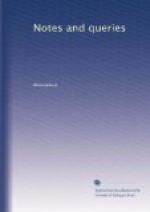“27. Several told
me of the storm that was brewing. Rumsey was
with 39 and was seem to come
out crying that he must accuse a
man he lov’d.
“Dec. 19.
A letter from 29 bidding me stay till I heard
farther from him.
“Jan. 5. I received a letter from L. marked by 29 in the margin to trust entirely in 10; and that in February I should certainly have leave to return. That matters were concerted towards it; and that 39 had no suspicion, notwithstanding of my reception here.
“Feb. 8. A letter from L. that my business was almost as well as done; but must be so sudden as not to leave room for 39’s party to counterplot. That it is probable he would choose Scotland rather than Flanders or this country; which was all one to 29.
“16. The sad news of his death by L. O cruel fate!”
Dr. Welwood cautiously adds, in a note:—
“That by 29 and 39 King
Charles and the Duke of York seem to be
meant. But I know not
what to make of the other numbers and
letters, and must leave the
reader to his own conjectures.”
There can, I apprehend, be little doubt that the L.R., under the date of November 26, were meant to indicate the patriotic Lord Russell.
The whole of these extracts possess the highest interest, establishing as they do several points referred to by historians. It is curious to remark the complete subjection in which Charles, at this period, stood towards his brother; occasioned, perhaps, but the foreign supplies which he scrupled not to receive, being dependant on his adhesion to the policy of which the Duke of York was the avowed representative. Shortly before his death, Charles appears to have meditated emancipation from this state of thraldom; and Hume says,—
“He was determined, it is thought, to send the Duke to Scotland, to recall Monmouth, to summon a parliament, to dismiss all his unpopular ministers, and to throw himself entirely upon the good will and affections of his subjects.” {399}
This passage accords with the entries in Monmouth’s pocket-book under the dates of Jan. 5. and Feb. 3. If the unfortunate Monmouth could have foreseen the miserable end, with all its accompanying humiliations and horrors, to which a few months were destined to bring him, his exclamation, “O cruel fate!” would have acquired additional bitterness.
C. ROSS.
[We insert the foregoing as serving to complete the series of interesting notices connected with the capture of Monmouth which have appeared in our columns, rather than from an agreement with the views of our valued correspondent. Dr. Anster states, that in the pocket-book in his possession, the Duke’s movements up to the 14th March, 1684-5, are given. Would he kindly settle the question by stating whether the passages quoted by Weldon are to be found among them?]
* * * * *




